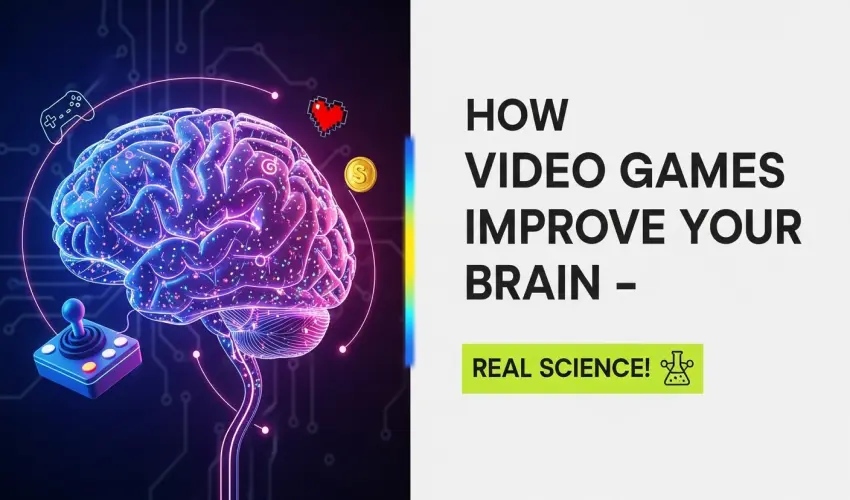How Video Games Improve Your Brain – The Real Science!
Published Aug 10, 2025
1 0
Key Takeaways
-
Scientifically Proven: Numerous scientific studies show that playing video games can improve critical brain functions like attention, memory, problem-solving, and spatial reasoning.
-
Action Games Sharpen Focus: Fast-paced action games can enhance visual processing, reaction times, and hand-eye coordination.
-
Strategy Games Boost Intellect: Puzzle and strategy games are proven to improve cognitive flexibility, decision-making, and long-term planning skills.
-
Social Skills Upgrade: Multiplayer and online games can foster social skills, teamwork, and effective communication.
-
Mental Health Support: Playing video games in moderation can be an effective tool for relieving stress, easing anxiety, and combating symptoms of depression.
Introduction: Gaming and the Brain – Beyond Entertainment
For decades, video games were often unfairly scapegoated as a "waste of time" or, worse, a negative influence. But today, science tells a very different story. When played in moderation, video games can actually train your brain, leading to measurable and significant improvements in cognitive function.
From enhanced memory and faster decision-making to better emotional regulation, gaming engages diverse areas of the brain in an immersive way. This article explores the real science behind how video games can make your brain stronger and your mind sharper, backed by research from neuroscientists and psychologists.
1. Sharpen Your Attention and Focus
Fast-paced action games like Call of Duty, Overwatch, and Fortnite demand constant vigilance, forcing players to scan visual information and react in fractions of a second. Studies published in journals like Nature show that action gamers are better at:
-
Selective Attention: Focusing on what matters while ignoring distractions.
-
Sustained Attention: Staying on-task and focused for extended periods.
Research from the University of Rochester confirmed that gamers consistently outperform non-gamers in visual attention tests.
2. Enhance Your Memory and Learning
RPGs, puzzle games, and complex narrative titles like The Legend of Zelda require players to juggle a huge amount of information. Players must:
-
Keep track of quests, items, and character inventories.
-
Manage resources and character abilities.
-
Remember dialogue choices and intricate plot points.
This directly trains your working memory—the brain's "scratchpad" for holding temporary information, a skill that is crucial for everyday learning and decision-making.
3. Boost Spatial Reasoning and Visualization
Games like Minecraft, Portal, and Tetris are virtual playgrounds for spatial logic. A study from the University of California, Irvine, found that participants who played 3D platformers showed a significant boost in the volume of their hippocampus, the part of the brain responsible for spatial memory and navigation.
Benefits Include:
-
Improved ability to mentally rotate objects and visualize 3D spaces.
-
Better object tracking and navigation.
-
Enhanced map-reading and sense of direction in the real world.
4. Improve Decision-Making and Reaction Time
In most games, speed matters. Whether you’re navigating a racetrack or making a split-second decision in a battle, your brain is being trained to:
-
Process visual cues rapidly.
-
Evaluate multiple options under pressure.
-
Respond in milliseconds.
A study in Psychological Science found that gamers can make decisions 25% faster than non-gamers without sacrificing accuracy. This rapid analysis has real-world applications in driving, sports, and emergency response situations.
5. Develop Problem-Solving and Strategic Thinking
Strategy games like StarCraft II and Civilization present players with complex challenges that require deep strategic thought. They compel players to:
-
Think critically under pressure.
-
Plan long-term strategies while executing short-term tactics.
-
Balance risk and reward.
-
Adapt to constantly changing circumstances.
The American Psychological Association has stated that strategy games can significantly boost cognitive flexibility—the ability to switch between different mental tasks or thought processes efficiently.
6. Build Social Skills and Emotional Intelligence
Contrary to the "lonely gamer" stereotype, modern gaming is a deeply social activity. Online multiplayer games like Among Us, Valorant, and Apex Legends require:
-
Real-time communication.
-
Team coordination and strategy.
-
Conflict resolution and cooperation.
A study from the University of Glasgow found that students who played cooperative games showed improvements in communication, adaptability, and emotional intelligence. For many, gaming provides a safe and comfortable space to socialize and build friendships.
7. Support Mental Health and Reduce Stress
Gaming can be a powerful tool for improving mental well-being.
-
Stress Relief: Casual, creative games like Animal Crossing and Stardew Valley can lower cortisol (the stress hormone) by offering a calming, non-linear experience with positive feedback loops.
-
Mood Boosting: Achieving goals, leveling up, and completing stories engages the brain’s dopamine reward system, which can lift spirits and bolster self-esteem.
-
Aiding Depression & Anxiety: Narrative-driven games like Celeste and Gris explore mental health themes, helping players process their own emotions and feel less alone.
8. Strengthen Brain Plasticity for Long-Term Health
Research from the Max Planck Institute shows that video games improve neuroplasticity—the brain's ability to reorganize itself and form new neural connections. Regular gameplay can:
-
Improve multitasking skills.
-
Help preserve cognitive function in older adults.
-
Potentially stave off age-related cognitive decline.
9. It's All About Balance: Tips for Healthy Gaming
While the cognitive benefits are clear, moderation is key. To ensure a healthy relationship with gaming:
-
Set time limits (e.g., 1-2 hours on weekdays).
-
Take regular breaks every 30-60 minutes to stretch and rest your eyes.
-
Balance gaming with physical exercise and outdoor time.
-
Choose age-appropriate games and avoid overly toxic online communities.
Conclusion: Game On!—For Real
The science is clear: video games can exercise your brain, strengthen your mind, and contribute to your mental well-being, especially when played mindfully. From fostering cognitive resilience to honing social skills, gaming is more than just play—it’s a mental workout.
So, the next time someone tells you that video games rot your brain, you can confidently tell them the truth:
“Actually, they can make it stronger—and I’ve got the science to prove it.”








